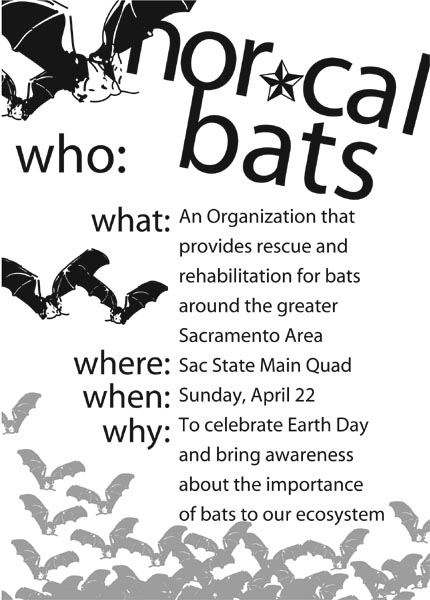Going batty for Earth Day

Click here to enlarge.:
April 26, 2007
They will suck our blood! They will suck our dog’s blood! They’re blind, creepy rodents with wings! This is just a small handful of the misconceptions that the general public has about bats. Mary Jean Quirk, who likes to be called “Corky,” is the founder and leader of the Northern California Bats. “They are not blind, and the only species that suck blood are located in Central America,” she said. “They are not related to rodents either. They are in an order of their own.”
Corky and the NorCal Bats will have a booth in the Main Quad alongside other exhibits Sunday in celebration of Sacramento Earth Day 2007. They plan to raise awareness and spread education about how significant bats are to our ecosystem.
“We want to clarify misconceptions about bats,” Corky said. “Hollywood has a lot to do with the way people perceive bats.” Aside from educating the public about bats, The NorCal Bats is an organization that specializes in the rescue and rehabilitation of bats. The organization is based out of volunteer homes that are located around Davis and Grass Valley.
“People call from around the greater Sacramento Valley and up into the foothills, and, depending on where the bat is, a volunteer will go and retrieve it,” Corky said.
The bat is then brought into the care of one of the volunteer homes. The bat is fed and cared for until it is ready to be released back into the wild.
“We triage it. We usually feed them fluids. There are vets that we work with if there is a broken bone, for example,” Corky said. “Babies drink a special formula. Eventually, they grow and they move on to insects and generally eat mealworms. If they’re weak, we will make a mealworm smoothie, which is mealworms in a blender with some extra nutrients, and they’ll eat from a syringe.”
The organization also has volunteers who make bat boxes. They are “human-made habitats – boxes with slots inside that bats will live in. We’ll put them on poles or any place to encourage bats to be in the area,” Corky said.
Winston Lancaster, who is a biology professor at Sacramento State, said NorCal Bats is a valuable service.
“The population of many wild animals are heavily impacted by human activity, and so whatever we can do to lessen that impact, I think, is a valuable contribution to population of wild animals,” Lancaster said.
Lancaster teaches mammalogy (study of mammals), comparative vertebrate anatomy and human anatomy. One of his specialties is the study of bats.
Although Lancaster supports the organization, he believes that there are bigger issues concerning bats. He said NorCal Bats is great on a local level. By rescuing individual bats that may be injured or preserving roosts (crevices where bats live) they are making a great contribution.
“There are so many different problems. Bats are threatened mainly by pesticides and public misconception, on a larger note,” Lancaster said. “People have misconceptions about bats and they think of them as pests. For example, if there is a colony of bats close to a home, people may try to kill them. People do not understand how important these animals are to the ecosystem.”
All bats in Northern California are insect eaters, Lancaster said. “One bat can eat its own body weight in one day,” he said. If bats weren’t around to provide insect control, our crops and agriculture would be ruined. And for many people living in Sacramento, an insect-infested city would not be too delightful.
If people had the right idea about bats, they wouldn’t want to kill them. Lancaster went on to clarify the misconceptions.
“They all carry rabies – this is not true. Rabies is a viral disease and will kill the bat in a short period of time. They are not blind, but they have small eyes,” he said, “People relate them to the mythology of vampires – the species that like blood are far from here. They do not fly in your hair or attack people. Most importantly, they are not a threat to children, domestic pets or any person in general.”
Lancaster said NorCal Bats’ visit to Sac State will provide valuable public education. “(NorCal Bats will) help people understand more about these animals and that they’re important components of the ecosystem, and not harmful to people, but actually helpful,” he said.
Mindy Yuen can be reached at [email protected]



































































































































